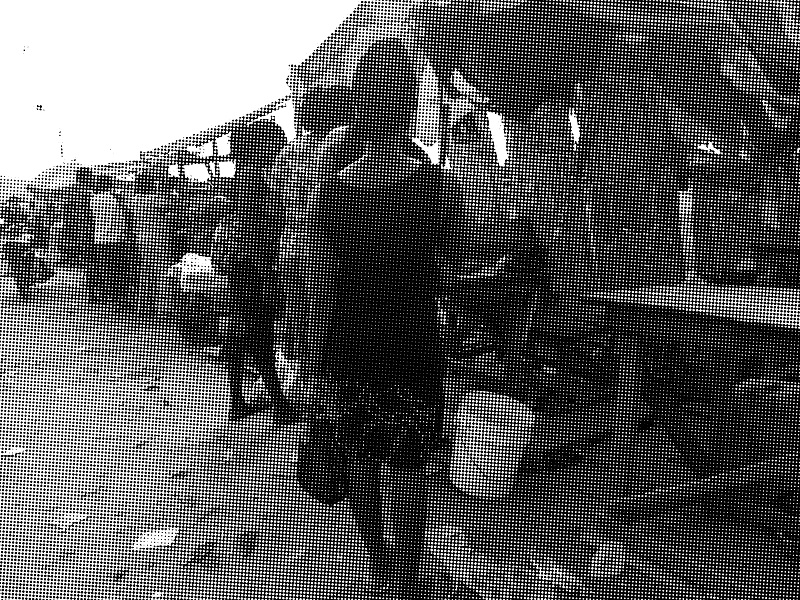Having been sent to the village – Creek Town, Cross River State – by her father for getting pregnant and abandoned by the baby daddy at age 17, Itoro worked hard to finish high school. She passed when her daughter turned two and then managed to enrol in university with the help of a newly found sugar daddy. Her father forgave her then.
Itoro is back in Abuja now, in the two-room Byazhin slum apartment -partly furnished and decorated with the gifts from the 52-year old married man-, she shares with her parents, two brothers and her daughter. “He provides almost everything I need and also gives me money for my mother,” she says about her ‘old man’ shyly, but with a smile of content.
My father forgave me after I got a sugar daddy
Trying to finish her thesis and graduating, so that she can get a job, is still a challenge, though. “There is no one to leave my daughter with. Private schools are too expensive and I don’t like what I see of the children in government schools.” Abuja’s region formally provides for early childhood care and development for children aged zero to eight, but the buildings lack facilities. Children sometimes sit on the floor, roofs are blown off and the children contend with the rains or harmattan dust, depending on the time of the year. Itoro says she is OK for now, but worries that she may end up alone, having invested her love and youth in a married man much older than her.
Family needs
Daki Biyu, Abuja
 Saratu (33) sells groceries and household items in Daki Biyu, a slum located next to Abuja’s posh Jabi district. The residents here are among the poorest in the city; they live from hair dressing, tailoring, mechanical services like fridge repairs, selling water in trolleys and scavenging among the stench of broken sewage in the streets. The slightly better off work as drivers, office messengers and cleaners for their affluent neighbours and offices in the district.
Saratu (33) sells groceries and household items in Daki Biyu, a slum located next to Abuja’s posh Jabi district. The residents here are among the poorest in the city; they live from hair dressing, tailoring, mechanical services like fridge repairs, selling water in trolleys and scavenging among the stench of broken sewage in the streets. The slightly better off work as drivers, office messengers and cleaners for their affluent neighbours and offices in the district.
Saratu once landed here from far away Zamfara in the north, having left to seek greener pastures after a youth of selling bread and groundnut in the village whilst dodging her father’s attempts to marry her off. But now her parents are aging -her mother is diabetic- and she needs to make enough money to send back home to support them and her younger siblings. The small grocery and household sales she makes with her kiosk in the area nowhere near cover those needs. Few people around here have money to buy from her and there are layers of dust over some of the plastic buckets and brooms on display.
READ: Sex work as the last resource: Risking death to feed your kids
So, she sleeps for money – ‘extra support’ as she calls it- with the mechanics and the tinker men who make noise around the corner from her kiosk as they mend their pots and pans. She keeps what she does a secret, since it is hardly something to be proud of, she says, but “I am the only hope my parents have. If I had a place, I could trust to take them to, I would have done that long ago. But there is no such thing. Sometimes I am able to send 3, 000 Naira (US 8) by month end, sometimes 5, 000 Naira (US 14).”
Dawaki village
Her family’s healthcare needs are also the reason lanky, tall Habiba (30), originally from Suleija in Niger State, needs to do sex work to supplement what she gets from her food stall. Divorced, and living in a shack she shares with her mother, a sibling and a few other tenants in yet another slum part of Abuja, Habiba looks after both the ones who live with her and her elderly father in Suleija. It is a heavy burden on her, being all alone -her two brothers have died-, but at the same time she is not at all sad that her polygamous husband back home divorced her after she ‘failed to prove herself as a woman’ four years ago. “Believe me, I was itching for it,” she says. “I wanted to be free of the emotional torture I was going through with his nagging and taunting from my co-wives who were popping out babies.” She danced when the divorce came through four years ago, she says.
Habiba only wishes for better health care in Nigeria
But no sooner had she settled in Dawaki Village, when she had to bring her mother, -who has gone blind and whose mental health has also deteriorated- and sibling to help with the care for her, into her single room. Her father is still far away at home, but he is hypertensive and she needs to send money for his healthcare and medication, too.
Asked how she makes ends meet her mood, which was almost joyous when she spoke of her divorce and her food stall business, changes. “If my parents had put me through secondary school and were not in a hurry to marry me off at 17, I would have been better off. But in their eyes and those of people around, I was becoming ‘old’ at home and nobody would marry me if they didn’t act fast.” Now uneducated, with only a traumatic marriage behind her, she had to find a way of providing to the needy family who married her off in the first place. Moving sale items pensively across the table, she reflects how she soon learned the ropes to the practice of sleeping with men for money. Having lived with friends in similar conditions, this was not too difficult “as they seemed to be experts at it.”
Still avoiding eye contact, she continues: “there is nothing enjoyable about it. As a divorced woman, I have to be careful that nobody finds out because the mockery and shame will be (devastating.) People would say that I was already doing this in my husband’s house, that is why he divorced me.” She only wishes for better health care in Nigeria. “It would be much easier if old people had free medical care at least. My parents’ health is my major headache.”
The first girl
Mpape, Abuja
Ima (22), from Uyo, Akwa Ibom State, also relocated to Abuja in search of greener pastures, but was lucky enough to find employment in a construction company full of white expatriate staff and subsequently, her own oyinbo (white man), who was her boss. “A lot of girls desire to be where I am. People respect you if you are involved with an oyinbo.”
A lot of girls desire to be where I am
Since her father became incapacitated following a car accident four years ago, Ima had to assist her street vendor mother to cater to the needs of the family. These are substantial: there are still three younger siblings and her father, paralysed after having been knocked down in the street by a hit and run driver, needs a lot of care. “We had to pay for everything from our pocket. Even the cost in the government hospital was expensive for us.” Although she is the third child, being the first girl in the family of six puts an extra burden on her, since the brothers don’t help: the older got married and started his own family, the other one moved out of the house. “So, I decided to relocate to Abuja to find an income. I first lived with an aunt for a year and a half, but now I am independent.”
Now residing in Mpape, one of the better-off suburbs in Abuja, Ima said she has a lot more independence and freedom than she used to have when she lived with family. “I am so lucky that my boss took an interest in me. Sometimes I receive even more from him than my basic monthly salary of 18000 Naira (US$ 50).”
My boss is married. He will not be in Nigeria forever.
She still hopes for an education, though, and would like to become an accountant. “As soon as my two younger sisters who are still in school can fend for themselves, I will start to focus on myself, too. My boss is married. He will not be in Nigeria forever.”
Funds to travel
Port Harcourt
As Timi (34) grew up, she saw her small, rural community of Eleme, on the outskirts of Port Harcourt, grown into a beehive of activities thanks to a myriad oil companies, port and allied businesses, with women and girls resorting to getting benefits from the expats. Making monetary demands of a man “was not something I was used to,” she says, the business woman demeanour vanishing and suddenly seeming shy, “but my mum ensured I went all the way.”
My mum ensured I went all the way
She was schooled by her mother on how to attract oyinbo. “For example, she told me I didn’t need to dress skimpy to attract the white men. Looking trashy would only get me stuck with one of the lowly ones.” It worked and it was with the proceeds from her relationship with an oyinbo oil servicing company employee that she began her footwear and handbag business in 2017. She now has the funds to travel regularly to Lagos to get her supplies. Her mum is the only one who knows where that money comes from. “My father and siblings just know about my footwear and handbags and they think that my business is booming. It’s all my last boyfriend before this knew as well.” She explains she can’t confide in anyone except her mother since her previous relationship was ‘spoilt’ by a friend who talked.
The oil and associated activities have not managed to uplift Eleme itself, though. Soot and pollution from the oil cause respiratory problems and other diseases; effective governance in terms of health, infrastructure and education is as absent here as it is in other parts of Nigeria. But it is good enough for Timi for now, even if she still has some major unfulfilled dreams: travelling abroad and building a house for her parents. Once these two are accomplished, “I can say, I have arrived.”
A borehole and a house
Benin City
Like Timi, Osaretin (29) also grew up here knowing she must fulfil her family’s expectations of economic support. And in Benin City, known as the capital of human traffic in Nigeria, since from all over the country young girls and women flock here to find pimps and hopefully a ticket to the US or Europe, there was and is only one way to do that.
What was demanded of her dawned on her already in her mid-teen years. “We would go to our neighbour’s house to fetch water from their borehole, and when we arrived there my mother would say to us, “na person like una do dis one for her mama o” (it is a girl like you who did this [built the borehole] for her mother.) She meant to say: why can’t you do things like that for me? Hearing her say such things made me hate going there.”
My mother asked: why can’t you do such things for me?
As houses built by other girls who had ‘made their way abroad’ began springing up, even Osaretin’s mother’s friends would throw jibes at her and her sisters, “asking if we were ‘happy’ and pointing out that my mother was still living with us the way she did when we were small. I was probably 17 at the time.” For mother and her friends, it wasn’t even good enough for Osaretin to find just any man. “The expectations were that I must find someone in Jand (London or Europe), Yankee (America) or Cana (Canada). I considered Cana, since I was too scared to traverse the Mediterranean.”
Osaretin’s break finally came when a son of one of her mother’s friends visited Benin City from Germany at Christmas a few years ago. The women jointly worked towards Osaretin and the friend’s son, beginning a relationship during his three-week stay. They encouraged her to have sex with him so that she would get pregnant. She isn’t yet, but the relationship is in place now.
Suddenly last year, however, through a mutual friend, Osaretin met another man. He is in Benin City, a local and also provides for her. She loves him a lot, she says, but can’t lose her Germany-based boyfriend. So, she has to keep her ‘real’ relationship secret, at least until she has been able to build her mother a house. “If for any reason the one in Jand goes, let it be after that, or at least after I have gathered enough money from him. That’s the most important thing for me now.”
Remarkably, Osaretin doesn’t blame her mother for any of this. She knows that the elder woman’s only hope for survival in her old age is for her to eventually travel abroad to be with the man ‘in Jand’ and send money home. Osaretin’s mother is a widow and the relatives of her deceased husband, Osaretin’s father, have “taken all she and dad had worked for,” the daughter says. “We were homeless when he died.” The tradition that allows only men to inherit property is at odds with new legislation in Nigeria, but it continues nevertheless.
Beans and celebrations
Asked why the new laws, introduced in 2015 to protect widows from disinheritance and homelessness, don’t seem to be implemented, Ministry of Women’s Affairs’ Director of Economic Affairs, Idris Mohammed, says that “we have not been able to successfully prosecute because by the time you begin to interrogate a victim and you want to invite the in-laws for questioning, (…) they don’t want (it) anymore.” This may have something to do with the prosecutorial approach of such cases, which involve hearing the “two parties,” since, when the in-laws are then invited to come and attend hearings with the prosecutor, the complainants tend to withdraw. Mohammed said: “they will then say that (it) can be resolved within the confines of the family and that they don’t want anything that (be) a stigma to themselves and to their children.”
On the matter of the Ministry’s assistance, if any, to vulnerable groups like widows and the elderly, Mohammed states that there are “intervention packages” and that these include “training” for widows and “giving them starter packs like grinding machines, depending on what their business enterprise holds.” He adds that “micro credit schemes are also available.”
Asked to explain why the Ministry’s budgets for the past five years then do not list care for the elderly or widows as one of the line items at all, Mohammed responded: “Last year, we couldn’t actually get to empower widows and do most of the interventions and starter packs because the budget of that line was not released. Even now, if I give you a figure on what we proposed, it will just be tentative -they’re just figures on paper. You’ll be very unfair to yourself when you say I’m spending this much and in the actual sense, it is not being spent.”
You’ll be very unfair to yourself when you say I’m spending this much
The director bluntly declined
The budgets, in contrast, do list a plethora of items like 63,756,866 Naira (US$ 177,000) for ‘Anniversaries and Celebrations’ in 2015 and 12,450,936 Naira (US$ 35 000) for ‘Refreshment & Meals’ for the Ministry itself in 2016.
Elijah Okon Akpan, the Ministry’s head of the branch for affairs concerning the elderly, said that his branch once a year supplies basic food stuffs like beans, rice and oil to elderly care homes (which are managed mainly by NGOs and missionaries throughout the country, ed.) but that there is no money to do more. He added that sometimes even the food supplies cannot take place for “lack of funds.”
Efforts were made to ask the Ministry of Health Affairs why health care is still such a burden, especially on daughters of needy families (close to half of Nigerians still qualify as living in extreme poverty); and why the oil-rich country has not been able to put a health safety net in place (1). A Federal Ministry of Health director, Ben Omogo, who currently oversees the National Health Insurance Scheme NHIS, refused to be interviewed, however. A contact at the Ministry, asked to help facilitate an interview with him on the matter said: “he has bluntly declined.”
- In spite of the National Health Insurance Scheme having been launched in Nigeria 12 years ago.
The names of the girls have been changed for reasons of privacy.
This investigation was done with the support of the Fund Pascal Decroos, www.fondspascaldecroos.org.

 Join Daily Trust WhatsApp Community For Quick Access To News and Happenings Around You.
Join Daily Trust WhatsApp Community For Quick Access To News and Happenings Around You.


